SPECIAL REPORT
Dead in our tracks: No trains, just more ruin as thieves and vandals strip Gauteng stations bare
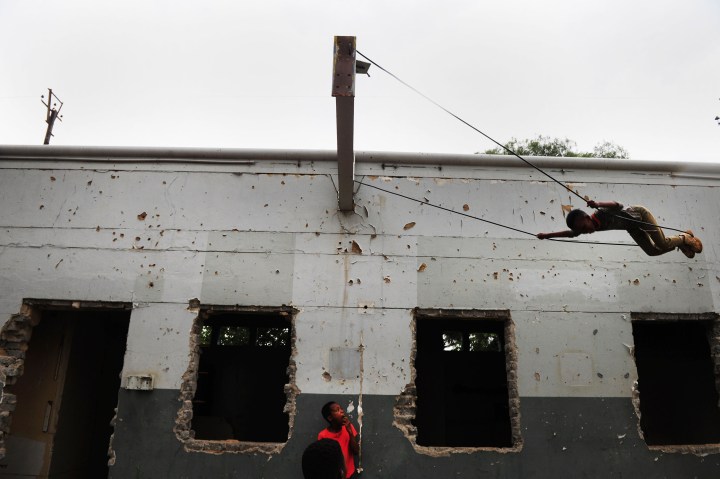
It’s been more than a year since unprecedented, rampant vandalism and theft of Metrorail infrastructure was exposed, but there is no indication that train services will be restored, with Gauteng’s, and the country’s, railway network in interminable ruin.
Daily Maverick reported on the pillaging and vandalism of railway infrastructure on 29 September 2020. Over several months we assessed at least 20 Gauteng train stations and routes including Kliptown, Germiston, Chiawelo, Midway, Knights, Jeppe, Residensia, Randfontein, Naledi and Doornfontein. The outcomes were devastating. Many other reports of large-scale looting in other provinces started to emerge.
Daily Maverick returned to some of the stations in recent weeks to see whether there were signs of rebuilding. This is what we found.
Jeppe Station
There are no words to describe the rapid decline of Jeppe Station in Johannesburg. Part of the structure is now jointly owned by a flight of doves, addicts and the homeless. Nothing is left except broken walls and, surprisingly, the railway tracks. While the doves have unlimited access, the addicts and the homeless’ stay is limited to nights when the security guards let down their guard.

The train station at Jeppe is usually guarded, despite the fact that there is barely anything to protect, aside from the tracks, with litter strewn everywhere on 17 November 2021. (Photo: Leon Sadiki)

Jeppe train station on 17 November 2021. (Photo: Leon Sadiki)
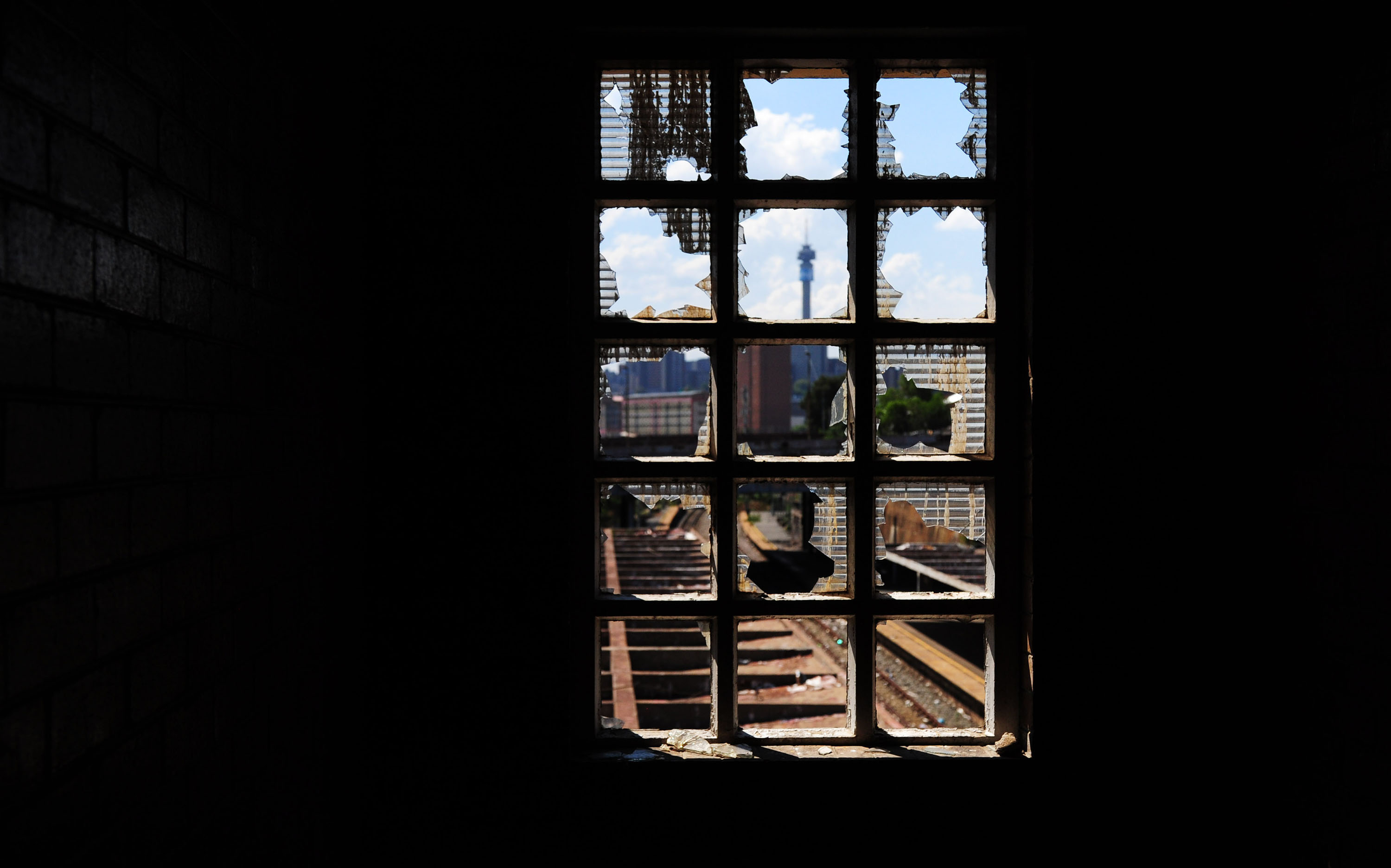
Jeppe train station with a backdrop of Johannesburg on 17 November 2021. (Photo: Leon Sadiki)

The Jeppe train station platform on 17 November 2021. (Photo: Leon Sadiki)

The outside of the Jeppe train station in Johannesburg on 17 November 2021. (Photo: Leon Sadiki)

Damaged tracks at the Jeppe train station with a backdrop of Johannesburg on 17 November 2021. (Photo: Leon Sadiki)

FLASHBACK: An image taken from inside the deserted Jeppe train station in Johannesburg on 7 April 2021. (Photo: Shiraaz Mohamed)
Heaps of rubbish are swept to one side of each of the many vandalised rooms. The corridor leading to the platforms is littered with rotten fruit, debris and other rubbish. A nose-polluting smell of human waste from inside the station lingers beyond the station precinct. A man entered one end of the station, urinated against a wall inside and walked out the other end.
Lisa Nkomo, a 78-year-old pensioner who sells fat cakes barely 5m from the station, said she had nowhere else to go. The City of Johannesburg gave her the stall a few years ago. “Where will I go, my child. I have no choice, I have to feed my family,” she said.
Nkomo has attracted new customers from among minibus taxi passengers near the crumbling, rotting station. But, she laments, the smell of faeces and urine coming from the station has compromised her business.
Jeppe Station used to be a hive of activity, bustling with people coming and going. As you left the station the most prominent sight was plumes of smoke from the Jeppestown factories dancing into the sky. Today, it appears those factories have gone the same way the station has.
Since our last visit, more homeless people and addicts have moved into the station. A lot more rubbish has accumulated along the tracks.
Kliptown Station
Only broken walls and, again surprisingly, the railway tracks remain at this station. Everything else has been stripped bare and structures partly demolished. Huge furrows are the only evidence that cables were once buried here. Kliptown residents used most of the non-copper cables to make illegal connections from the railway electricity supply.

A child plays on a self-made swing from one of the broken cables at Kliptown train station in Soweto on 17 November 2021. (Photo: Leon Sadiki)

Kliptown train station in Soweto on 17 November 2021. (Photo: Leon Sadiki)

The rail line at the Kliptown train station in Soweto on 17 November 2021. (Photo: Leon Sadiki)
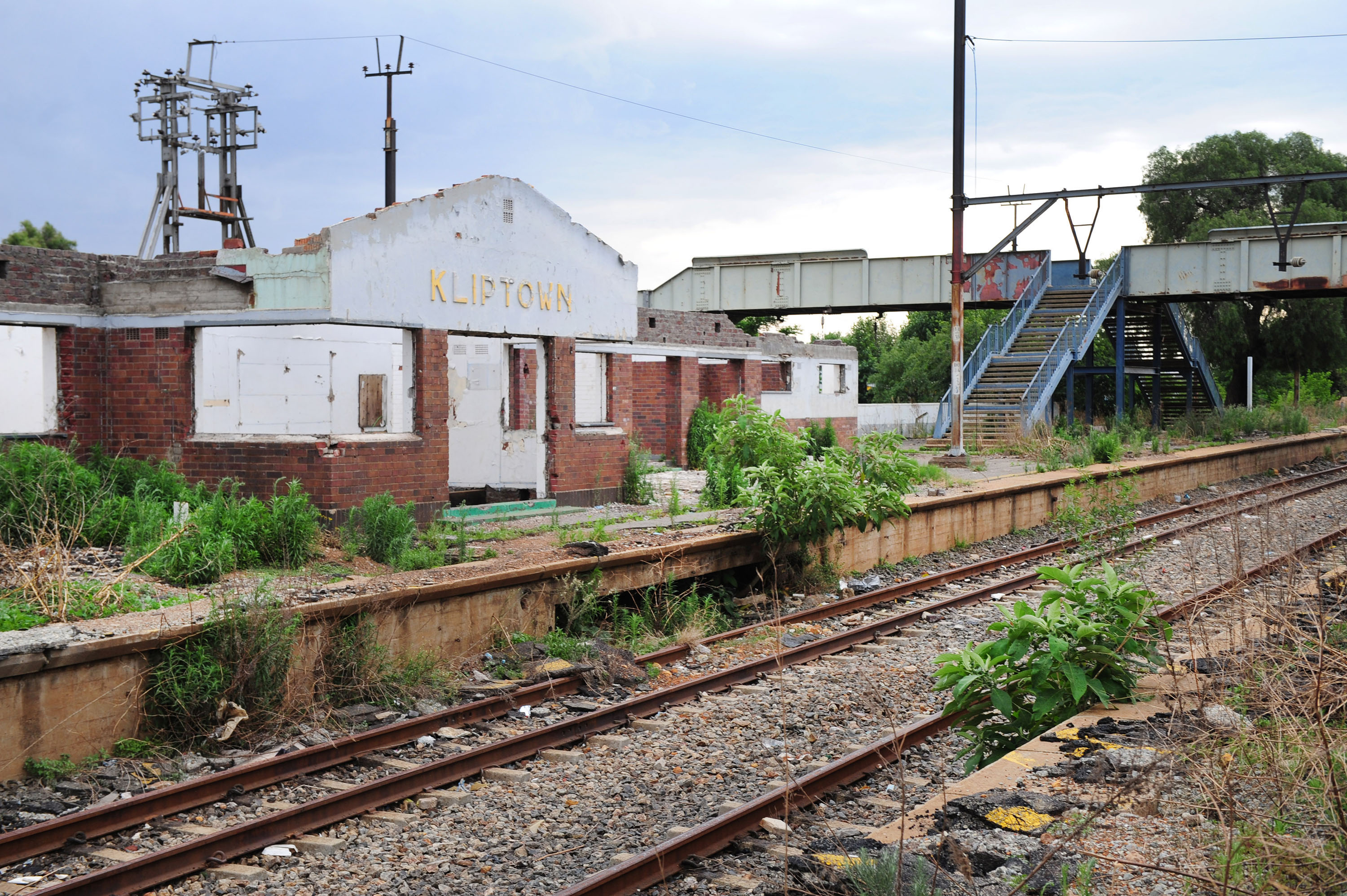
The desolate Kliptown train station in Soweto on 17 November 2021. (Photo: Leon Sadiki)
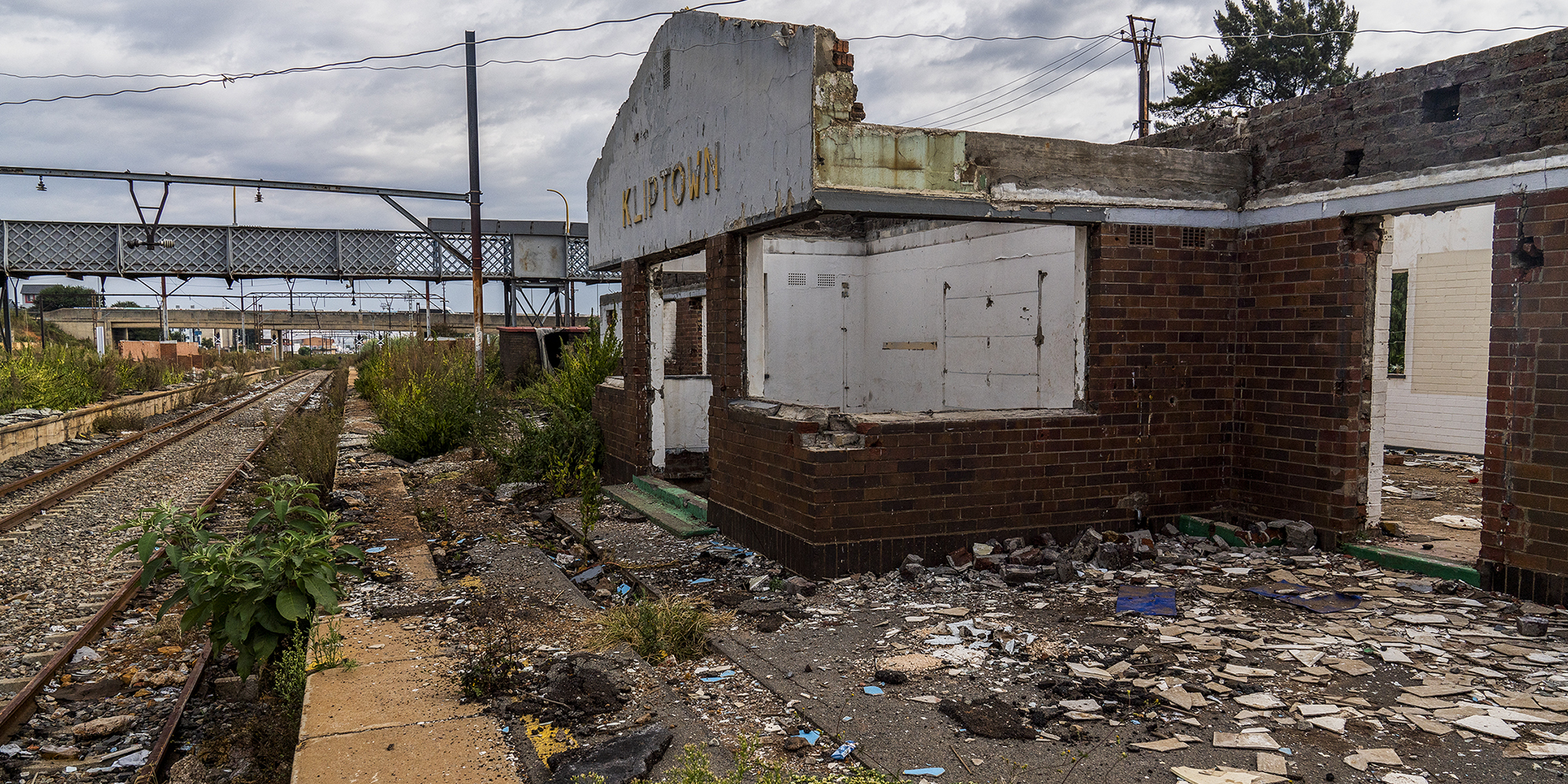
FLASHBACK: A bare shell is all that remains of the stripped Kliptown train station in Gauteng on 7 April 2021. (Photo / Shiraaz Mohamed)

FLASHBACK: The Kliptown train station, stripped by thieves, on 7 April 2021. (Photo: Shiraaz Mohamed)
When we visited in April 2021, Kliptown Station had already been stripped. The walls of some of the waiting rooms and many other structures have since been broken. There are signs that criminals recently discovered the underground cables.
Local children have used the discarded non-copper cables to make swings in one of the station buildings.
The station is overgrown and deserted. The swinging children are the only sign of life. Not a single security guard has been spotted at Kliptown Station during recent visits, including Wednesday, 17 November.
Jeppe is usually guarded, despite the fact that, like Kliptown, there is barely anything to protect aside from the tracks.
Old Benrose Station
At Old Benrose Station, on the other hand, the railway tracks have been stolen. It is clear that the thieves work with well-resourced partners since they would need to transport the tracks. Markings on the ground are the only sign that trains did indeed run.
Since our last visit, a further stretch of rail has been stolen. The rest of the station remains in ruin.
Benrose Station is now listed as closed on GPS. As photographer Leon Sadiki drove towards the station, which is surrounded by corrugated iron shacks, he “honestly couldn’t tell where the entrance was”. Unlike in the past, it is now impossible to see it from the N2 freeway as you drive past George Goch Hostel, southeast of Johannesburg.
It is as if it vanished overnight.
“However, on the ground, the place is a hive of activity, with people enjoying their green and brown bottles on paths leading to the station. A clear indication that any attempt to access the station with camera equipment could get you in a dangerous situation.”
As a result, photographs were not taken this time around.

FLASHBACK: Missing railway tracks at the Old Benrose station in Johannesburg in September 2020. (Photo: Shiraaz Mohamed)
Tshiawelo Station
Only broken walls and many pieces of cable on the ground remain at this station near Chiawelo in Soweto. The power distribution boxes have been dismantled and cables stolen.
In fact, everything has been stolen.
Last time we saw one of the guardrooms had been burnt – it has since been stripped completely. The station is now good for only one thing: one of the overhead bridges connects Eldorado Park and Tshiawelo station and offers easy access to people who want to visit the graves of loved ones at Avalon cemetery.

The vandalised Tshiawelo train station on 17 November 2021 in Soweto. (Photo: Leon Sadiki)

Cables hanging at the Tshiawelo train station on 17 November 2021 in Soweto. (Photo: Leon Sadiki)

The Tshiawelo train station in Soweto on 17 November 2021. (Photo: Leon Sadiki)
Commuters pay the price
“Covid-19 and the level of theft/vandalism resulted in commuters using taxis. The infrastructure was stripped to the bare minimum, making it difficult to return all lines back to operations,” Gauteng Metrorail spokesperson Tony Games told Daily Maverick this month.
And they forked out more for taxis, whereas trains were significantly cheaper. On the now completely dysfunctional Vereeniging-Johannesburg line, for instance, a monthly ticket cost R200, whereas the same trip costs at least R1,200 by taxi.
It’s not clear how many people still use the limited train service, but clearly, the number has dropped drastically from the 100,000 who depended on trains daily in Gauteng. According to Games, there were 100 million commuter trips in 2018/19.
According to the 2020 National Household Travel Survey, taxis account for the most public transport users (80.2%.) The study also shows a significant decline in train travellers. In 2013, the last time the survey was conducted, about 700,000 South Africans travelled by train. By 2020, the number had plummeted to 150,000.
Between 2018 and 2020, 1,833 incidents of vandalism occurred at train stations in Gauteng, resulting in replacement costs in excess of R2-billion, it was revealed in a parliamentary response to a DA question in June 2020.
In September 2020, the Passenger Rail Agency of South Africa (Prasa) estimated that rail infrastructure damage would cost at least R5-billion in Gauteng. This was disclosed before a Daily Maverick follow-up report in April 2021 warning that the criminals were back for whatever was left.
Asked how much it will cost the rail agency to restore train services, Games said: “Metrorail Infrastructure projected R500-million by march 2022 and R2,2-billion has been projected by next year 2022/23 on six priority corridors to restore the lines with proper overhead traction equipment, traction substations, fencing/walling and rehabilitation of stations.”
In September 2020, Transport Minister Fikile Mbalula said the looting and vandalism would cost at least R4-billion nationally. The cost is likely to have ballooned, although it was not possible to obtain an estimate. He said the problem stemmed from Prasa’s “ineptness”.
The problems at Prasa led to a revolving door of CEOs, with many, if not all, leaving the rail agency under a cloud. Its most recent CEO, Zolani Matthews, got the boot after the board said he failed to disclose his British citizenship and that he had interests in a company that did business with Prasa. David Mphelo has been appointed on an acting basis.
During a Prasa presentation before Parliament’s select committee on transport on 21 September, it reported that of its 24 corridors nationally, 12 had opened since 1 July 2020. Another 12 were expected to reopen in October.
But one of the corridors Prasa said it would prioritise – Mabopane in Pretoria – failed to reopen by the end-of-November deadline. Phase one was recently completed and the rail agency is yet to make an announcement about its reopening.
The looting and vandalism are not restricted to Gauteng, but cut across the country. At the select committee, MPs expressed concern that Prasa’s rebuilding plans seemed to focus on Gauteng, KwaZulu-Natal and the Western Cape when all provinces needed equal attention.
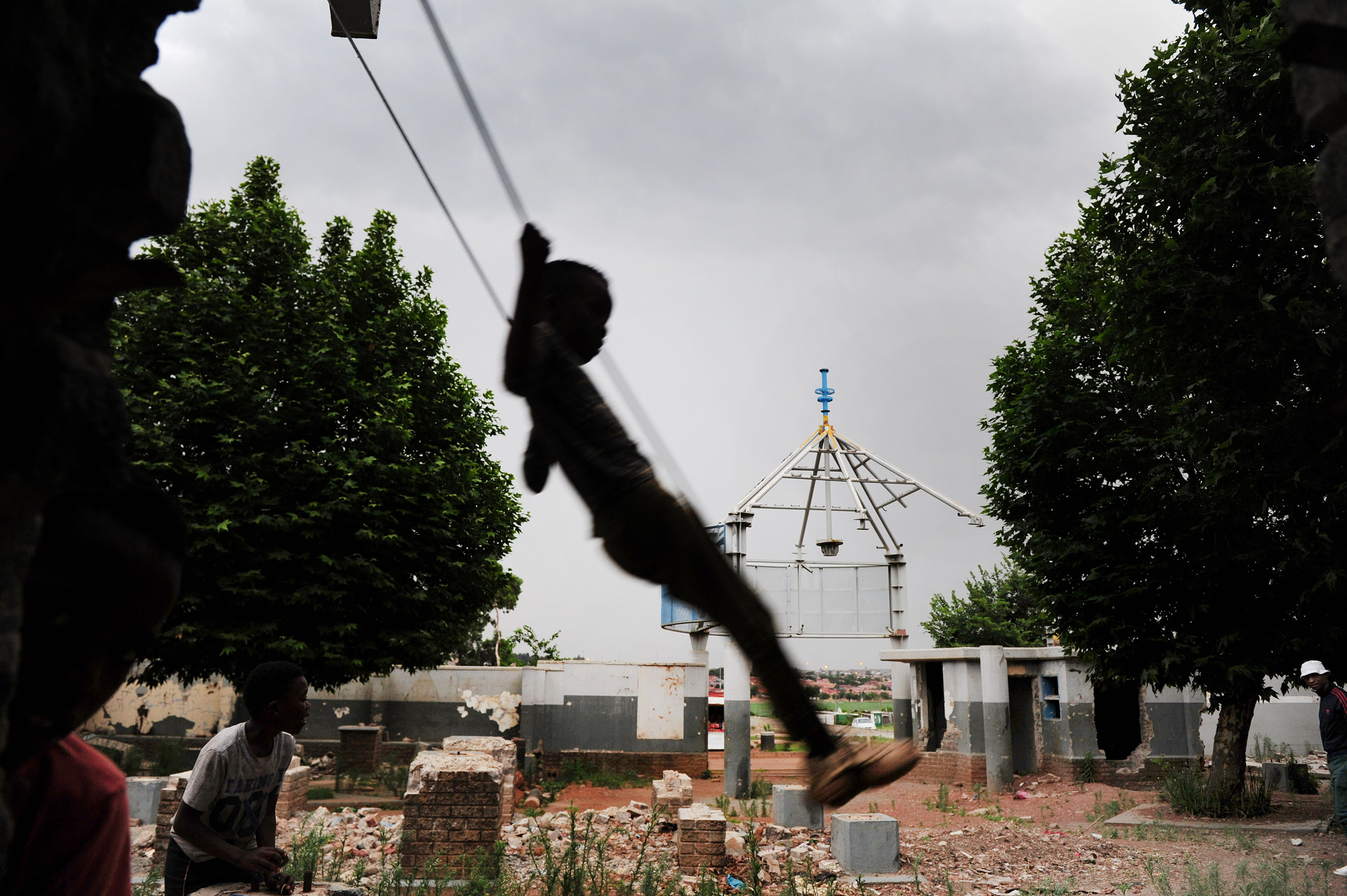
A child plays on a self-made swing from one of the broken cables at Kliptown train station in Soweto on 17 November 2021. (Photo: Leon Sadiki)
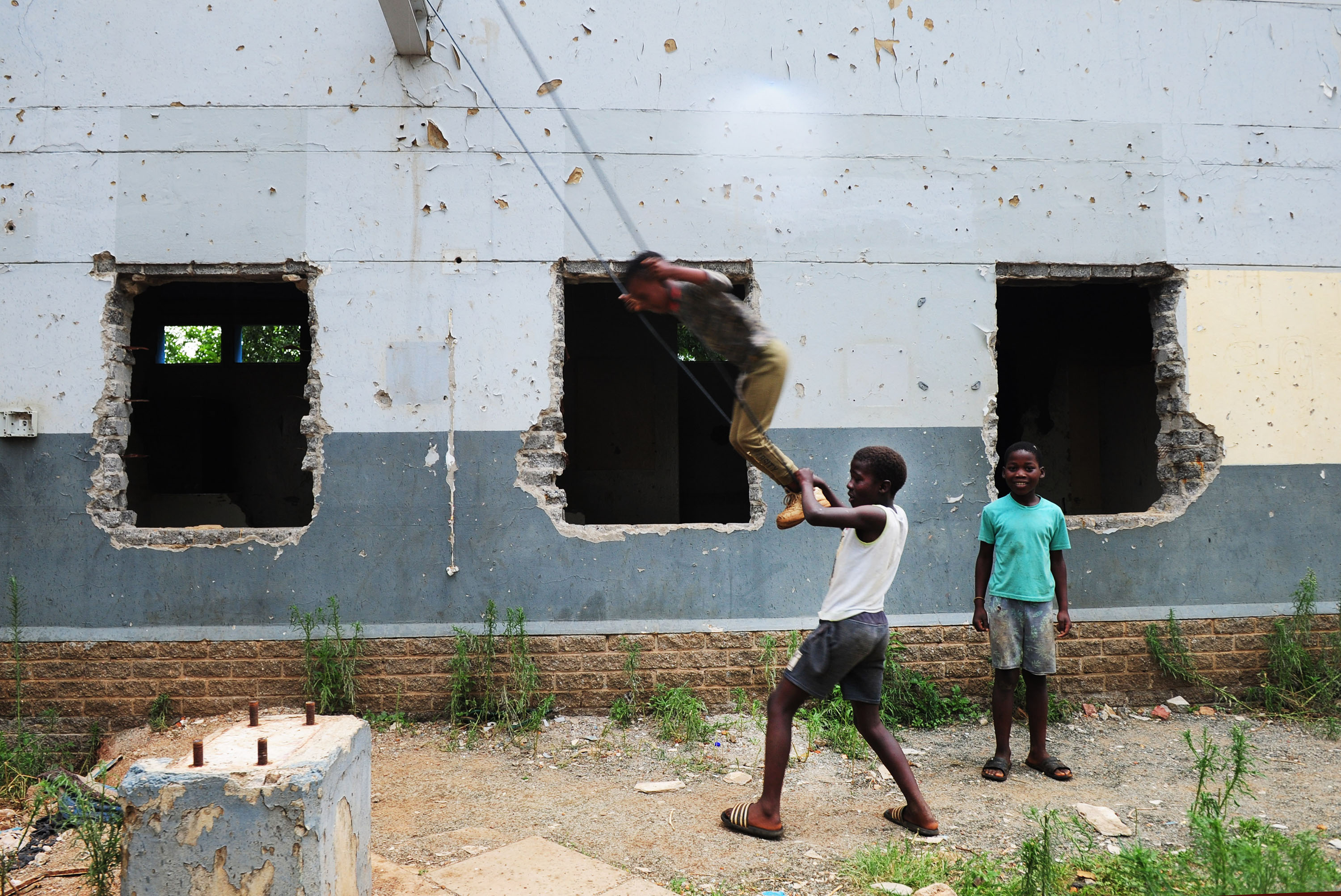
Children play on a self-made swing from one of the broken cables at Kliptown train station in Soweto on 17 November 2021. (Photo: Leon Sadiki)

Children play at the deserted Kliptown train station in Soweto on 17 November 2021. (Photo: Leon Sadiki)
Few convictions
There have been arrests, sometimes involving syndicates and Prasa’s own employees, Mbalula said. They include six men nabbed by the SAPS and Prasa protection services in August 2020. They were found in possession of copper cables and signalling equipment worth more than R5.5-million.
Convictions, however, have been few and far between.
Many of the big court cases of equipment theft have been postponed several times. It was reported on 1 December that Cape Town magistrate Ronel Oliver highlighted in a cable theft case that both Prasa and the police had been tardy in bringing statements to court for prosecutions to get under way.
In September, Prasa told Parliament that contingency efforts involved providing a full bus service or bus and railway systems, but this has not materialised because, according to the agency, stakeholders refused to cooperate. One of the difficult stakeholders was the taxi industry.
“The plan was not implemented,” Games said.
Prasa has called for the deregistration and closure of scrap metal dealers found in possession of Prasa property and for their operating licences to be revoked.
Prasa did not respond to emails specifically asking why it had failed to restore train services.
Looting and vandalism have continued even after Prasa hired security guards. Asked why protection services were still deployed at stations that had been stripped bare, Games said they were there to prevent invasion of the rail tracks and to protect other assets such as signals, point machines and overhead cables.
In many of the affected stations, overhead cables and the point machines or point motors have been stolen or destroyed. DM
[hearken id=”daily-maverick/8881″]


















 Become an Insider
Become an Insider
Another disaster brought to us by the ANC. Hope the whole of SA realises real soon, the ANC cannot be part of the solution, it is the problem.
Devastating story. The CT to Simonstown train, a very scenic route here has stopped. The Phillip route stopped with shacks now sprawling all over the railway lines. This is devastating and it seems to me the DA is struggling too in the WC. It’s been years now and the copper war needs a more strategic and serious intervention than mere party politics dynamics that aren’t getting us anywhere. Lawlessness is fed by well resourced ‘syndicates’. That’s heartbreaking indeed.
While this is a tragedy, there is not much new information in this article apart from some rather bleakly beautiful photography. You mention that the repairs to the Mabopane corridor are proceeding but the hopeless tone of the article seems to imply that it might never open – recent posts to social media prove otherwise and show the new trains operating well in their testing phase. I’m not sure what the delay is on opening that corridor – but wouldn’t it be a more complete story to cover that rather than going over this depressing ground again?
As we have seen in July, it takes 2 days to completely destroy infrastructure that takes months/years to build.
These criminals are destroying things faster than what it can be rebuilt.
These criminals should be charged with terrorism, because that is exactly what it is.
The tragedy here is that the country cannot afford to replace this infrastructure. The culprits have committed economic suicide and taken thousands of their people with them
One can respond with one word Useless ! but then the absolute absence of the SAPS can’t be mere coincidence. Can Minister of Police be called for comment if he is not chasing across the country with Mr Mbalula the mouth in a blue light convoy?
Maybe this has been set up so that Makanyane can pick it up again. What a joke this country is.
These pictures are tragic, as are the stories, and are a symbol of the hollowed out state of our country and many of its institutions. But this cannot be the end of our story. Everyone who can, must do whatever is necessary to bring solutions and work to make them happen. ” The people who really change the world are the one who see what’s possible and figure out how to make that happen.” (thank you @gapingvoid)
Well done cadres at Transnet, well done. Another success story of the ANC and the tenderpreneurs.
The ONLY way this is ever going to stop is if the useless police actually arrest some of these thugs, they must then be charged with terrorism and sentenced to 50 years in jail. No possibility of parole.
Do this to a 30 thugs, and do it quickly, not a 7 year court case.
The problem goes away.
How the SAPS miss this is the problem. Infighting for control of all Departments just lead to citizens suffering. Soon there will be no more cash to loot as SARS take more and more from the very few tax compliant. Cant go on forever.
A nation’s economic well-being is judged by the state of its railways. ‘Nuff said…
What an excellent article, well illustrated. I am so far removed from reality being in a reasonable privilege environment. To comment on it is actually absurd, as the reasons are well known. The sad reality is I, as a person, can do nothing about it. But thanks to you, Bheki, I am now aware, how close this country really is to Armageddon. My heart absolutely bleeds for those suffering as a result
Absolutely devastating!
The looting was started by Mbalula’s predecessors selling miles of rails to China for scrap, what a great example they set for their electorate.
In the past ten years;
our rail network – destroyed,
our electricity network – fatally weakened,
our military – fatally weakened,
our health services – fatally weakened,
our justice system – fatally weakened,
our postal system – destroyed.
If a foreign power had been involved, these would have been acts of war and the internal saboteur (ANC) guilty of treason.
…and even more sadly, that’s a short list.
Heartbreaking.
Bloody unbelievable! There are actually no words.
“Prasa has called for the deregistration and closure of scrap metal dealers found in possession of Prasa property and for their operating licences to be revoked.”
So no suggestion of charging people with grand theft or jail-time? By this account, a mere slap on the hand is expected to work wonders.
What do you expect? I once stayed at the Miekles hotel in Zimbabwe on a business trip. A sign in the room said “Please store your valuables in the safe provided. Thou shalt not tempt!”
In all my life, I have never seen a more apt encapsulation of the African attitude to theft. Theft occurs because you, yes you, are tempting the thieves. The thieves would not be thieves but for your bad behaviour in tempting them.
This article and these photos, must be one of the saddest things I have read and seen lately. It simply shows the whole process, now accelerated, of total decline and destruction of SouthAfrica’s vital infrastructure, mainly under the ANC led government. Somebody should show these pictures internationally, to spur the state into doing something about it, although we know that the cadres at the helm feel no shame. If the police had functioned , this damage would be less. Imagine showing these photos at one of Cyril Ramaphosa’s “investment” conferences!
I am of the opinion that the vandalism of our railway networks in the various metros was originally perpetrated by the taxi industry.
And still copper and metal are allowed to be traded and exported. That’s how this pillage starts: it has a market. In a context of one of the world’s most unequal societies and economic systems, of course criminals are going to cash in, even if they are not at the top of the criminal chain.